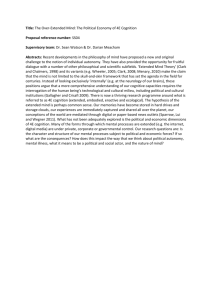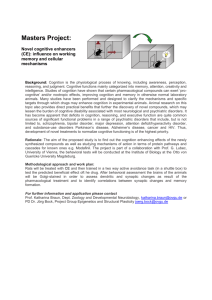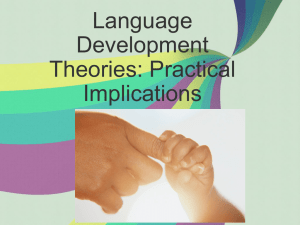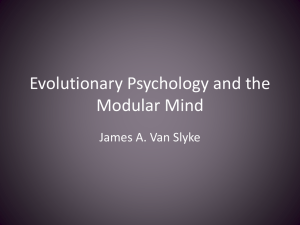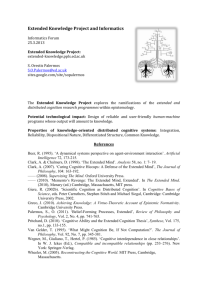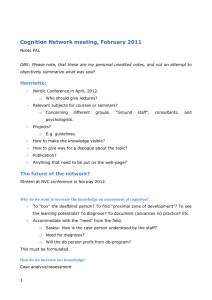1. General Intelligence Hypothesis
advertisement
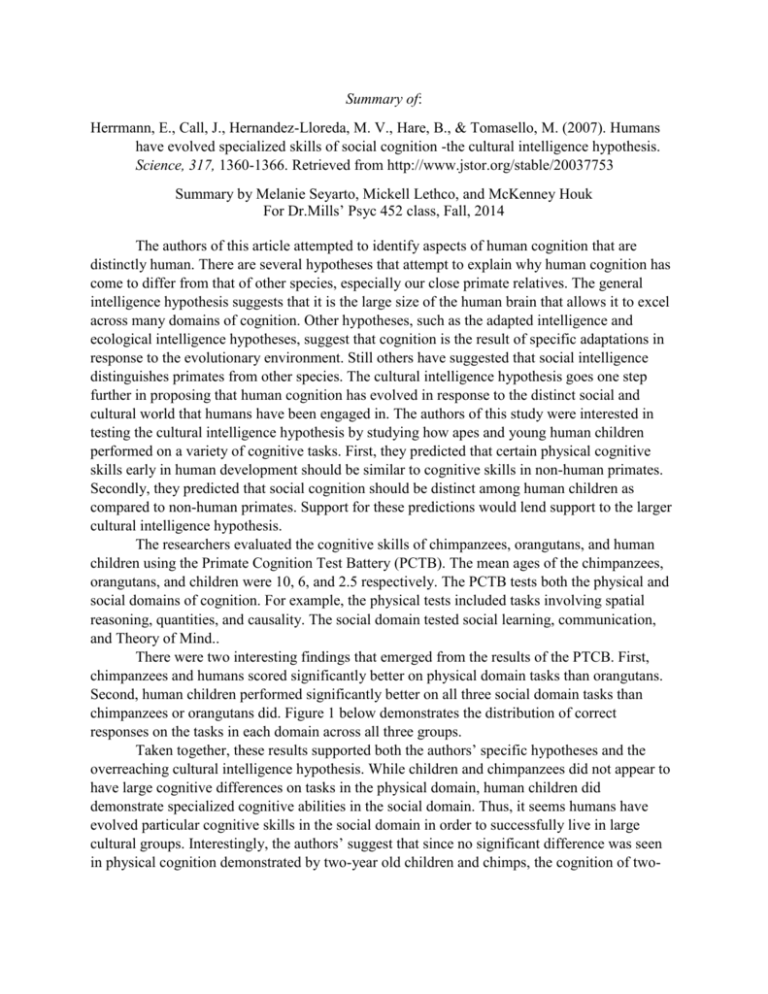
Summary of: Herrmann, E., Call, J., Hernandez-Lloreda, M. V., Hare, B., & Tomasello, M. (2007). Humans have evolved specialized skills of social cognition -the cultural intelligence hypothesis. Science, 317, 1360-1366. Retrieved from http://www.jstor.org/stable/20037753 Summary by Melanie Seyarto, Mickell Lethco, and McKenney Houk For Dr.Mills’ Psyc 452 class, Fall, 2014 The authors of this article attempted to identify aspects of human cognition that are distinctly human. There are several hypotheses that attempt to explain why human cognition has come to differ from that of other species, especially our close primate relatives. The general intelligence hypothesis suggests that it is the large size of the human brain that allows it to excel across many domains of cognition. Other hypotheses, such as the adapted intelligence and ecological intelligence hypotheses, suggest that cognition is the result of specific adaptations in response to the evolutionary environment. Still others have suggested that social intelligence distinguishes primates from other species. The cultural intelligence hypothesis goes one step further in proposing that human cognition has evolved in response to the distinct social and cultural world that humans have been engaged in. The authors of this study were interested in testing the cultural intelligence hypothesis by studying how apes and young human children performed on a variety of cognitive tasks. First, they predicted that certain physical cognitive skills early in human development should be similar to cognitive skills in non-human primates. Secondly, they predicted that social cognition should be distinct among human children as compared to non-human primates. Support for these predictions would lend support to the larger cultural intelligence hypothesis. The researchers evaluated the cognitive skills of chimpanzees, orangutans, and human children using the Primate Cognition Test Battery (PCTB). The mean ages of the chimpanzees, orangutans, and children were 10, 6, and 2.5 respectively. The PCTB tests both the physical and social domains of cognition. For example, the physical tests included tasks involving spatial reasoning, quantities, and causality. The social domain tested social learning, communication, and Theory of Mind.. There were two interesting findings that emerged from the results of the PTCB. First, chimpanzees and humans scored significantly better on physical domain tasks than orangutans. Second, human children performed significantly better on all three social domain tasks than chimpanzees or orangutans did. Figure 1 below demonstrates the distribution of correct responses on the tasks in each domain across all three groups. Taken together, these results supported both the authors’ specific hypotheses and the overreaching cultural intelligence hypothesis. While children and chimpanzees did not appear to have large cognitive differences on tasks in the physical domain, human children did demonstrate specialized cognitive abilities in the social domain. Thus, it seems humans have evolved particular cognitive skills in the social domain in order to successfully live in large cultural groups. Interestingly, the authors’ suggest that since no significant difference was seen in physical cognition demonstrated by two-year old children and chimps, the cognition of two- Figure 1. Proportion of correct responses on tests of physical and social cognition Physical Social 1 Proportion correct Proportion correct 1 0.8 0.6 0.4 0.2 0 0.8 0.6 0.4 0.2 0 Human Chimpanzee Orangutan Human Chimpanzee Orangutan (Herrmann et al., 2007) year old humans may be nearly equivalent that of the common ancestor of chimpanzees and humans. The researchers also explained one hypothesis that describes why humans may have initially began to evolve advanced social cognition: The ecological conditions within which post-erectus humans' special skills of social cultural cognition evolved are not known, but one hypothesis is that those skills evolved in support of especially complex forms of collaborative activity, such as hunting or gathering, supported by special skills of communication and social learning. These skills presumably grew out of earlier evolved primate skills of social cognition and learning in general, such as those that nonhuman primates display in their everyday interactions with groupmates in the wild, involving an understanding of the intentions, perceptions, and motivations of others (Herrmann et al., 2007, p. 1365). While the authors’ indicate that further research will need to be done to explain the specific evolutionary circumstances of the emergence of specialized social cognition in humans, there study provides preliminary evidence of the specific similarities and differences that exist between humans and closely related primate species. Outline I. Cognition Compared: An Overview of Hypotheses A. Human Specific Hypotheses 1. General Intelligence Hypothesis -Larger brains enable more efficient cognitive operations in humans than in other species 2. Adapted Intelligence Hypothesis -Cognitive abilities adapted to deal with challenges in the ancestral environment 3. Cultural Intelligence Hypothesis -Cognition is the result of the development of many different social and cultural groups B. Primate Specific Hypotheses 1. Ecological Intelligence Hypothesis -primate cognition was primarily shaped by environmental challenges such as collecting resources 2. Social Intelligence Hypothesis -primate cognition primarily shaped by development of social groups and challenges of competition and cooperation C. Goals of Current Study 1. Define distinctive features of human cognition – especially in early developmental stages 2. Evaluate early stages of development to evaluate cultural and general intelligence hypotheses II. Methods – Measuring Different Cognitive Domains A. Primate Cognition Test Battery (PCTB) 1. Physical Cognition -Space, Quantities, Causality 2. Social Cognition -Social Learning, Communication, Theory of Mind B. Participants 1. Chimpanzees, Orangutans, Human Children C. Procedure 1. Each participant given PCTB 2. Temperament test given to test comfort level 3. Inter-Observer Reliability was high for all tasks III. Results – Cognitive Differences between Humans and Apes A. Main Findings 1. Humans and Chimps higher scores in physical cognition than Orangutans 2. Humans scored higher than Chimps and Orangutans on social cognition tests 3. Human children more skillful than both ape species on all three social scales IV. Discussion – Support for Cultural Intelligence Theory A. Implications 1. Human beings have developed some specialized social-cognitive skills 2. No support for general intelligence hypothesis 3. Why specialized skills in human cognition? - Increased cooperation and collaboration of ancestors created specialized adaptations for social communication and learning B. Other Findings/Limitations of Study 1. Few differences in cognition resulted from gender and individual differences 2. Difficult to determine if tests were equally appropriate for both apes and human children C. Future Directions 1. Identify specific phenotypes that reflect adaptive behavioral and cognitive skills Critical Review Items A.) Three Informative Points 1. Introduction carefully outlined major hypotheses on topic and helped establish understanding for rest of the paper 2. Interesting that physical cognition does not differ significantly across species but social cognition seems to be specialized in humans 3. Function-Form: Authors made specific predictions based on evolutionary theory B.) Three Criticisms 1. Social tasks may have been more of interest/importance to human children than conducive to the normal environment of chimps or vice versa 2. Author does not go into great detail of the evolutionary significance of the each specific finding. For example, why might orangutans perform more poorly on tasks of physical cognition than humans and chimps? 3. Many of the tasks made use of reward systems and these rewards are not specified in the article. Depending on the differing ecological environments of chimps and humans, rewards may have held differing values Test Questions 1. The General Intelligence Hypothesis states that: A.) The size of human brains enables more efficient cognition B.) The ancestral social groups of humans contributed to specialized cognitive adaptations C.) Foraging and hunting in the EEA developed specialized human cognitive abilities 2. This study found that humans tested ____ chimpanzees and ____ orangutans in tasks having to do with physical cognition A.) Better Than; Worse Than B.) The Same As; Better than C.) Better than; The Same As 3. The results of this study provided strong support for: A.) The Ecological Intelligence Hypothesis B.) The Social Intelligence Hypothesis C.) The General Intelligence Hypothesis 4. Significant differences were shown in physical and social domains of cognition between chimps and humans (T/F) 5. It is hypothesized that collaboration and communication in the ancestral environment allowed for humans to develop specialized social cognition (T/F) 6. Human children showed greater skills than both chimps and orangutans on all three social scales (T/F)
